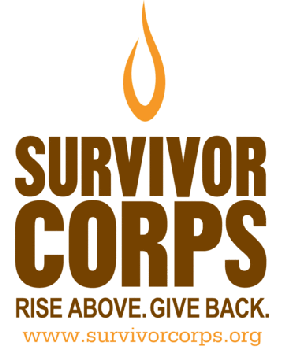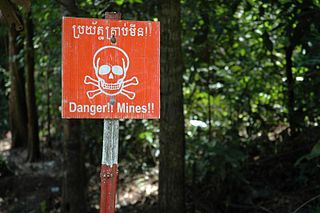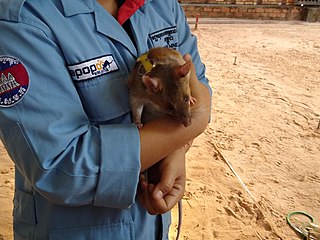
A land mine, or landmine, is an explosive weapon concealed under or camouflaged on the ground, and designed to destroy or disable enemy targets, ranging from combatants to vehicles and tanks, as they pass over or near it.
The Vietnam Veterans of America Foundation (VVAF), established in 1980, now the Veterans for America (VFA), is a Washington, D.C.-based international humanitarian organization that addresses the consequences of war and conflict. The founder of VVAF is Bobby Muller, a former U.S. Marine lieutenant and Vietnam veteran.

The HALO Trust is a humanitarian non-government organisation which primarily works to clear landmines and other explosive devices left behind by conflicts. With over 10,000 staff worldwide, HALO has operations in 28 countries. Its largest operation is in Afghanistan, where the organization continues to operate under the Taliban regime that took power in August 2021.
Adopt-A-Minefield is a British charity which raises awareness about landmines and their associated problems, and raises funds to clear minefields and help survivors of landmine accidents. It has raised over US$17 million since it was established in the 1990s, enabling it to clear minefields in 126 villages in Afghanistan, Angola, Bosnia-Herzegovina, Cambodia, Croatia, Iraq, Laos, Mozambique and Vietnam.

Survivor Corps, formerly known as the Landmine Survivors Network, was a global network of survivors helping survivors to recover from war, rebuild their communities, and break cycles of violence. The organization operated programs in Albania, Armenia, Azerbaijan, Bosnia-Herzegovina, Burundi, Colombia, Croatia, El Salvador, Ethiopia, Georgia, Jordan, Kosovo, Macedonia, Montenegro, Serbia, Uganda, Rwanda, the United States and Vietnam.

Cambodia is a country located in Southeast Asia that has a major problem with land mines, especially in rural areas. This is the legacy of three decades of war which has taken a severe toll on the Cambodians; it has some 40,000 + amputees, which is one of the highest rates in the world. The Cambodian Mine Action Centre (CMAC) estimates that there may be as many as four to six million mines and other pieces of unexploded ordnance in Cambodia. Some estimates, however, run as high as ten million mines.
A mine clearance organization, or demining organization, is an organization involved in the removal of landmines and unexploded ordnance (UXO) for military, humanitarian, or commercial reasons. Demining includes mine clearance, as well as surveying, mapping and marking of hazardous areas.

The region of Nagorno-Karabakh and areas around it are considered to be some of the most heavily mined regions of the former Soviet Union. Mines were laid from the early 1990s by both Azerbaijani and Armenian forces during and after the First Nagorno-Karabakh War. The worst-affected areas are along the fortified former contact line between Azerbaijani and Armenian forces, in particular in the districts of Aghdam, Fuzuli and Jabrayil. According to military experts from both Azerbaijan and Armenia, the ground in those areas is covered with "carpets of land mines." The region has the highest per capita rate in the world of accidents due to unexploded ordnance.

Istālif is a mostly Tajik village 29 kilometres (18 mi) northwest of Kabul, Afghanistan, situated at an elevation of 1,693 metres (5,554 ft) in the Shomali Plains, west of Kalakan and south-west of Bagram. It is the center of Istalif District, Kabul Province, Afghanistan.
Land mines in Latin America and the Caribbean are a by-product of the Cold War-era conflicts starting off in the 19th century. Contrary to the requirements of generally accepted international law, the minefields of Latin America and the Caribbean, were usually unmarked and unrecorded on maps. Once placed, mines remain active for decades, waiting the pressure of an unwary foot to detonate. As of 2023, within all of the Americas the only nations not to ratify the AP Mine Ban Convention are Cuba and the United States.
Farza District, also referred to as Farza, is district of Kabul Province, Afghanistan, with a population of 18,000 people. It's located 45 km north of Kabul, in the hills of the northwestern part of the Shomali Plain, and south of the villages of Istalif and Qarabagh. Farza District contains eighteen villages. The district headquarters is Dehnawe Farza. According to the UNHCR, in 2002, the population consisted of a mixture of Pashtuns and Tajiks.

Kenneth R. Rutherford is the co-founder of the Survivor Corps, a group that helps the victims of war, and an American researcher in the field of political science. He is also a member of the International Campaign to Ban Landmines, which was the recipient of the 1997 Nobel Peace Prize. Rutherford has served as the Director of the James Madison University Center for International Stabilization and Recovery, a Peace Corps Volunteer in Mauritania (1987-1989), a UNHCR Emergency Refugee Coordinator in Senegal (1989), and a humanitarian emergency relief officer in northern Kenya and Somalia (1993). In 2024, Rutherford taught at Hue University in Vietnam as a Fulbright Scholar Fellow.

Jackson Demonstration State Forest is a public forest in Mendocino County, California managed by the California Department of Forestry and Fire Protection. It is the largest demonstration forest operated by the State of California. The forest land is located along California State Highway 20 between Willits and the coastal city of Fort Bragg. It is named after Jacob Green Jackson, founder of Caspar Lumber Company, which formerly owned the land. The forest holds sacred value as an ancestral home and ceremonial site for the Coyote Valley Band of Pomo Indians.

The Skoll Foundation is a private foundation based in Palo Alto, California. The foundation makes grants and investments intended to reduce global poverty. Billionaire entrepreneur Jeffrey Skoll created the foundation in 1999.

The Mines Advisory Group (MAG) is a non-governmental organization that assists people affected by landmines, unexploded ordnance, and small arms and light weapons.

APOPO is a registered Belgian non-governmental organisation and US non-profit which trains southern giant pouched rats and technical survey dogs to detect landmines and tuberculosis. They call their trained animals 'HeroRATs' and 'HeroDOGs'.

The United Nations Mine Action Service (UNMAS) is a service located within the United Nations Department of Peacekeeping Operations that specializes in coordinating and implementing activities to limit the threat posed by mines, explosive remnants of war and improvised explosive devices.

The Shomali Plain, also called the Shomali Valley or Kohistan, is a plateau just north of Kabul, Afghanistan. It is approximately 30 km wide and 80 km long. Shomali means 'windy' or 'northern'. Most of the population is Tajik and some Pashtuns. Charikar, Qarabagh, Istalif, and Bagram are just some of the villages located within the Shomali Plan. It's a fertile area, where fruits and vegetables are cultivated and Kabul's residents picnic on weekends. The area is known for agriculture including grapes, walnuts, apricots, mulberries, pomegranates, and sour cherries. The village of Istalif is especially famous for its deep turquoise and green pottery.

The Mine Kafon Drone is a drone for demining, led by Afghanistan-born Massoud Hassani. The drone is designed to map an area for land mines, detect the mines, and then detonate them remotely. It has been field-tested with the Dutch Ministry of Defence. The use of a drone is safer and less expensive than typical methods for mine removal, which endanger trained mine disposal experts and dogs. The Mine Kafon Foundation, established by Hassani in 2013, is based in Eindhoven, Netherlands.
Heidi Kühn, an American from California, was the 2023 winner of the World Food Prize for her work with the nonprofit organization Roots of Peace to remove landmines around the world and turn the land into productive agricultural areas.













